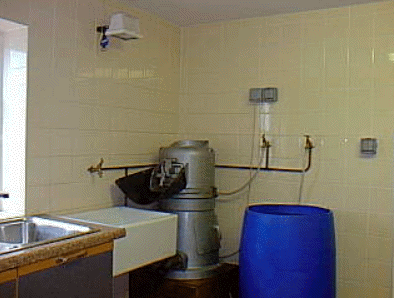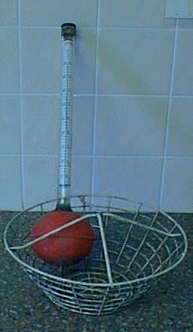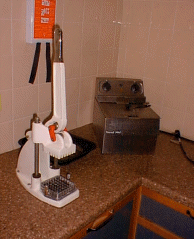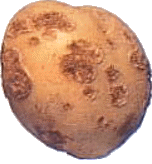|
 Our purpose built
quality control room adjoins the main store. In it we are able to
perform a series of tests on our products. Our purpose built
quality control room adjoins the main store. In it we are able to
perform a series of tests on our products.
We empty a sample bag onto the inspection table to
assess the overall shape, size and quality of the product. |
|
 Then half of the
table is randomly chosen and 3.63Kg (8lbs) is digitally weighed out for
use in a test to determine the dry matter of that particular sample of
potatoes. This is done by placing the correct weight of potatoes into a
small wire basket to which we then add a float with a range on the top.
This assembly is lowered into a large drum holding 200 litres of clean
water. When this has settled we take the percentage dry matter reading
of the sample. It is important to make sure that the dry mater is
correct for good chips. Anything below 19.5% will not keep very well
once cooked and the finished chips will go soggy. Anything above 23%
will produce chips that are too crispy and hollow. Then half of the
table is randomly chosen and 3.63Kg (8lbs) is digitally weighed out for
use in a test to determine the dry matter of that particular sample of
potatoes. This is done by placing the correct weight of potatoes into a
small wire basket to which we then add a float with a range on the top.
This assembly is lowered into a large drum holding 200 litres of clean
water. When this has settled we take the percentage dry matter reading
of the sample. It is important to make sure that the dry mater is
correct for good chips. Anything below 19.5% will not keep very well
once cooked and the finished chips will go soggy. Anything above 23%
will produce chips that are too crispy and hollow.
The potatoes are peeled in a special peeler identical to those used in many chip shops. This is followed by another quality check for defects like bruising beneath the skin which, is not apparent until the potatoes have been peeled . We will also be looking for any other damage which may be present such as mechanical damage inflicted during the harvesting process. It is also very important to look out for green potatoes which, cause wastage and can be toxic if eaten. |
|
 We then select five
or six potatoes at random and put them though our chip maker. This
produces chips that are of a uniform size and shape, 13mm (1/2”)
square, making it easier to compare each sample against another. After
cutting the chips we weigh out 1.5 lbs of them for frying. We then select five
or six potatoes at random and put them though our chip maker. This
produces chips that are of a uniform size and shape, 13mm (1/2”)
square, making it easier to compare each sample against another. After
cutting the chips we weigh out 1.5 lbs of them for frying.
We fry the sample for 5 minutes in our Lincat LDF fryer, which has been preheated to 180 degrees Fahrenheit. After the strictly controlled frying time we check the chips for fry colour and texture. Fry colour and texture is very important, a dark fry would be classed as a number 5 which would be fairly BROWN. this table goes down to 000 fry colour which is nearly white, usually too white for general chip shops. We try to find potatoes that produce a 0 –1 fry colour this would be a golden YELLOWchip. |
|
| We are suppliers to "Allports" - Award winning fish and chips |
HOME
© W.F. Head & Sons 2002. All rights reserved
Designed and hosted by CaditOnline
